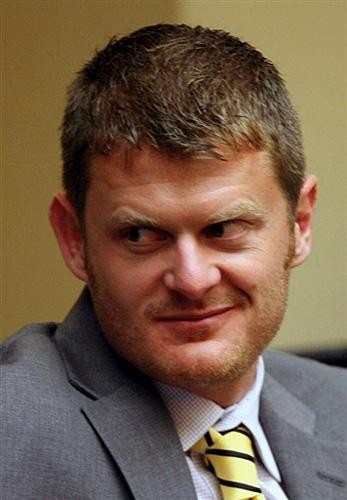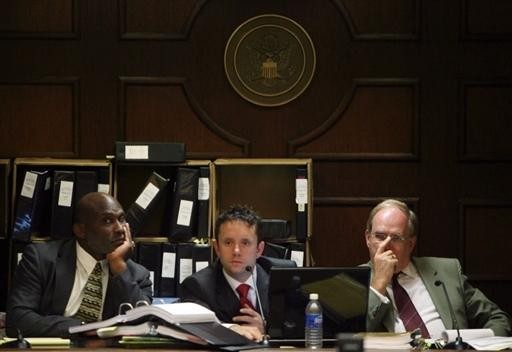Landis' appeal denied, two year suspension levied
By Mark Zalewski, North American Editor The long awaited decision is in, and Floyd Landis has lost...


By Mark Zalewski, North American Editor
The long awaited decision is in, and Floyd Landis has lost his appeal to the American Arbitration Association to overturn the sanction for his positive drug test from the 2006 Tour de France. The three member arbitration panel, led by president Patrice Brunet along with Christopher Campbell and Richard McLaren, was split 2-1 in the guilty verdict, with Campbell dissenting.
The decision will likely have some instant effects, with the ASO champing at the bit to remove Landis as the 2006 winner. The next possible steps in the case involve either Landis accepting his sanction from USADA or appealing the decision to the Court of Arbitration for Sport in Switzerland – with the second much more likely.
Landis is still weighing his legal options, but released a statement calling the decision "a blow to athletes and cyclists everywhere." The statement continued, "For the Panel to find in favor of USADA when, with respect to so many issues, USADA did not manage to prove even the most basic parts of their case shows that this system is fundamentally flawed. I am innocent, and we proved I am innocent."
UCI president Pat McQuaid spoke with Cyclingnews about the decision Thursday afternoon, confirming that the ban had been handed down. "It is true, we have been in contact with USADA and others about it," McQuaid said. "We can confirm that Pereiro will be the winner of the 2006 Tour de France, and that Floyd Landis will get a two year ban." According to the USADA judgement, Landis' suspension will run from 30th January 2007. The panel rejected the submission that it should begin from the 5th August 2006, the day on which he was fired from his Phonak team.
Campbell's dissenting opinion was expected, as he was chosen as an arbitrator by Landis' team and was the dissenting opinion in the Tyler Hamilton case, and is normally more sympathetic to the athlete's case. Campell's decision complained that the LNDD laboratory had "cherry picked" the data in order to find the adverse result, and stated, "From the perspective of 'safeguarding the interest of athletes,' any anti-doping system must be held accountable, like the athletes. If there are flaws in procedures for testing, as evidenced above, those flaws should be immediately disclosed [...] Drug testing agencies should not be playing hide the ball when athletes' careers are on the line."
Landis positive drugs test came after his seemingly superhuman comeback in stage 17 of the 2006 Tour. Three days after the Tour finished the news of a presumptive positive by Landis was leaked to the media. Faced with the prematurely leaked information before he could even wrap his own head around the situation, Landis fired off a variety of possible explanations.
Get The Leadout Newsletter
The latest race content, interviews, features, reviews and expert buying guides, direct to your inbox!
The findings indicated that Landis' testosterone ratio was well above the acceptable limit, which prompted the testing lab to look for exogenous testosterone. The French LNDD lab (Laboratoire de Chatenay-Malabry) found synthetic testosterone in Landis' samples.
Over the next several months Landis surrounded himself with a team of lawyers, experts and public relations professionals to mount a wiki-defense, calling into question that called into question the tests, testing procedures, the French laboratory, as well as the United States and World Anti-Doping Agencies (WADA.) This all culminated in May at Pepperdine University when the AAA preceedings of Landis vs. USADA began.
Both sides presented cases that focused on the science behind the testing, with the Landis side plainly saying that the LNDD lab was incompetent, the tests were flawed and that the results should not even be admissible. The USADA side began its defence of the ADRB findings by presenting expert testimony, which were matched by Landis' experts saying the inverse. However, the proceedings were turned upside-down when the USADA side took a different tack and brought former Tour de France winner Greg LeMond and former racer Joe Papp to the stand.
LeMond testified about conversations he had with Landis that seemingly implied Landis was hiding something. In the course of this testimony it was revealed that Landis' business manager, Will Geoghegan, had made threatening phone calls to LeMond to dissuade him from testifying.
The testimony by Joe Papp for USADA, a former low-level elite cyclist, revealed how he himself had used testosterone, as well as many other illegal drugs, to gain a performance advantage. Even though he plainly said that using testosterone "definitely improves your recovery and help you get back to whatever your best threshold power is," Landis' lawyers called the veracity of his testimony into question, citing a deal he had with USADA regarding his suspension.
Still, in the end, the case was about the science – for both the Landis and the USADA sides – with the arbitration panel determining that the facts were not enough to call the findings of the tests into question.
Full transcripts from the Floyd Landis arbitration hearing are available from USADA, click here.
Cyclingnews' coverage of the Floyd Landis case
September 28, 2008 - Landis takes case to US federal court
September 10, 2008 - Landis signing with current Health Net-Maxxis team for 2009
July 1, 2008 - CAS delivers final blow to Landis legal challenge
June 30, 2008 - Landis loses final appeal
June 28, 2008 - Landis decision due Monday
March 12, 2008 - Landis' judgment day nears
October 21, 2007 - Landis files appeal with CAS
October 18, 2007 - AFLD takes another look at Landis case
Thursday, October 11 - Landis continues fight, appeals to CAS
Saturday, September 22 - UCI officially names Pereiro 2006 Tour champion, Landis case raises issues
Friday, September 21 - Landis' appeal denied, two year suspension levied